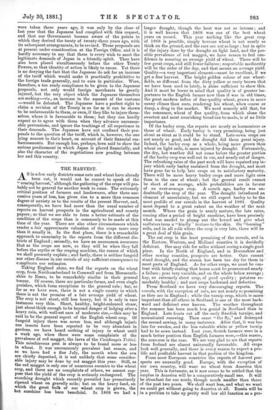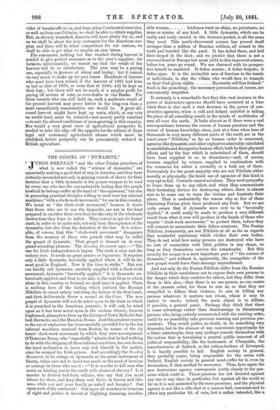THE HARVEST.
AS in a few early districts some oats and wheat have already been cut, it would not be correct to speak of the "coming harvest," although the gathering of the crops will pro- bably not be general for another week to come. The extremely critical position of farmers and landowners, after three suc- cessive years of loss, has given rise to a more than common degree of anxiety as to the results of the present Harvest, and, consequently, we have had more than the usual number of reports on harvest prospects in the agricultural and county papers ; so that we are able to form a better estimate of the condition of the crops than is commonly to be made at this time of the year. There are also other circumstances which render a fair approximate valuation of the crops more easy than it usually is. In the first place, there is a remarkable approach to unanimity in the reports from the different dis- tricts of England ; secondly, we have an uncommon assurance that as the crops are now, so they will be when they fall before the scythe or the reaping machine, the reason of which we shall presently explain ; and lastly, there is neither fungoid nor other disease in our cereals of any sufficient consequence to c3mplicate our estimates.
Taking England alone, we find the reports on the wheat crop, from Northumberland to Cornwall and from Monmouth- shire to Essex, to be remarkably similar in their general tenour. Of course, there are particular farms, and even single parishes, which form exceptions to the general rule ; but, so far as we have seen, there is not a single county in which there is not the promise of a fair average yield of wheat. The crop is not stout, still less heavy, but it is only in rare instances very thin. Short, healthy, bright-coloured straw, just about thick enough to be beyond danger of lodging after a heavy rain, with well-set ears of moderate size,—this may be said to be the general report of the English wheat crop. Of fungoid injury there was never less, and although injuri- ous insects have been reported to be very abundant in gardens, we have heard nothing of injury to wheat until a week ago, when there were some complaints of the prevalence of red maggot, the larva of the Cecidonlyia Triad. This mischievous pest is always to be found more or less
in wheat. It was uncommonly prevalent last season, and as we have had a fine July, the month when the ova are chiefly deposited, it is not unlikely that some consider- able injury may be done by red maggot this year. Still, as the red maggot is only one of numerous enemies to the wheat crop, and there are no complaints of others, we cannot sup- pose that the yield of the crop is seriously endangered. The scorching drought which recently prevailed has prematurely ripened wheat on gravelly soils ; but on the heavy land, on which the great bulk of our wheat crop is grown, the hot sunshine has been beneficial. In 1868 we had a longer drought, though the heat was not so intense ; and it is well known that 1868 was one of the best wheat years on record. This year nothing like the great crop of 1868 is possible, simply because wheat is not nearly so thick on the ground, and the ears are not so large ; but in spite of the injury done by the drought on light land, and the pos- sible prevalence of red maggot, we have reason to feel con- fidence in securing an average yield of wheat. There will be few great crops, and still fewer failures ; respectable mediocrity will be the order of the day, and that means, an average yield. Quality—a very important element—must be excellent, if we get a fine harvest. The bright golden colour of our wheat- fields, so different from the dirty yellow or rusty brown that we have been used to lately, is alone sufficient to show this. And it must be borne in mind that quality is of greater im- portance to the English farmer now than it was in old times, the great modern influx of fine-quality wheat, grown in more sunny climes than ours, rendering his wheat, when coarse or damp, a drug in the market. We need scarcely add that, for the consumer, wheat of fine quality, from which alone the sweetest and most nourishing bread can be made, is of no little importance. Of the barley crop, the reports are nearly as harmonious as those of wheat. Early barley is very promising, being just abaut as stout as it could be to stand. Late-sown crops are not nearly so good, and the drought did them great injury. Indeed, the barley crop as a whole, being more grown than wheat on light soils, is more injured by drought. Fortunately, the dry, hot weather did not come before the greater portion of the barley crop was well out in ear, and nearly out of danger. The refreshing rains of the past week will have repaired any in- jury which early barley sustained from the drought, and must have gone far to help late crops on to satisfactory maturity.. There will be more heavy barley crops and more light ones than in the case of wheat ; but the general result cannot be short of an average, while probabilities are in favour of an over-average crop. A month ago, barley was un- doubtedly the crop of the year. The drought introduced an element of uncertainty, but we still expect barley to be the most prolific of our cereals in the harvest of 1881. Quality must depend to a great extent on the weather of the next month. Where the grain is nearly mature, the late rains, coming after a period of bright sunshine, have been precisely what was needed to plump out the kernel and give what 'Inhalers term a "kindly" texture to the skin. On "burning" soils, and in all soils where the crop is very late, there will be a great deal of thin grain. The oat crop is the least promising of the cereals, and in the Eastern, Western. and Midland counties it is decidedly' deficient. One may ride for miles without seeing a single good piece. In the North of England, and in Devonshire and other sowing counties, prospects are better. Oats cannot stand drought, and the season has been too dry for them in' most parts of England. As for other crops, we must be con- tent with briefly stating that beans must be pronounced nearly a failure ; peas very variable, and on the whole below average ; hay, an extremely short crop, of good quality ; potatoes re- markably healthy ; and root crops backward and defective. From Scotland we have very discouraging reports. The cereals, with the exception of oats, are not nearly so promising as they are in England ; while the turnip crop, which is more: important than all others in Scotland, is one of the most back- ward and deficient ever known. The weather throughout the summer has been much less genial in Scotland than in England. Late frosts cut off the early Swedish turnips, and • necessitated resowing. Then came "the fly," and destroyed the second sowing, in many instances. After that, it was too late for swedes, and the less valuable white or yellow turnip
had to be sown instead. Last year, Scotch farmers were in a much better position than English farmers were,—this season, the converse is the case. We are very glad to see that reports from Ireland are almost universally favourable. All crops look well generally, and there is eve y reason to expect a pro- lific and profitable harvest in that portion of the kingdom.
From most European countries the reports of harvest pro- spects are unusually good. Europe, with the exception of our own country, will want no wheat from America this year. This is fortunate, as it now seems to be settled that the surplus in America will be a comparatively small one. It will be abundant for our needs, though much smaller than those• of the past two years. We shall want less, and what we want we could get without going to America at all. Russia will be in a position to take up pretty well her old function as a pro- rider of breadstuffs to us, and from other Continental countries, as well as from our Colonies, we shall be able to obtain supplies. But, as already remarked, America will have plenty for us, and as we shall be about the only customers for the American sur- plus, and there will be other competitors for our custom, we shall be able to get what we require on easy terms.
For consumers, nothing but fine weather during harvest is needed to give perfect assurance as to the year's supplies ; for farmers, unfortunately, we cannot say that the result of the harvest will be so satisfactory. The year may be a paying one, especially to growers of wheat and barley ; but it cannot do very much to make up for past losses. Hundreds of farmers who must have been ruined, if the harvest of 1881 had been as bad as that of 1879, or even that of 1880, will be kept on their legs ; but there will not be much of a surplus profit for paying off arrears of rent, or over-drafts at the Banks. For those tenants who can still hold on, such a moderate result of the present harvest may prove better in the long-run than a more immediately remunerative one would be. A great all- round harvest might have kept up rents, which, at any rate on arable land, must be reduced—not merely partly remitted —to snit the altered conditions of corn-growing in this country. Nor would a very great wave of agricultural prosperity be needed to take the edge off the appetite for the reform of those legal and customary agricultural abuses which must be abolished, before prosperity can be permanently restored to British agriculture.



































 Previous page
Previous page